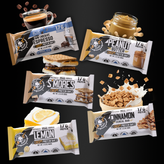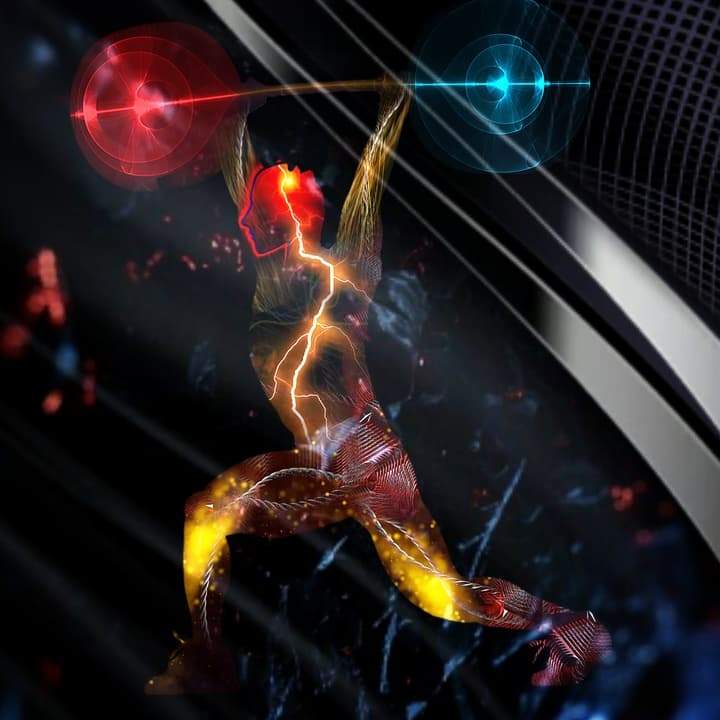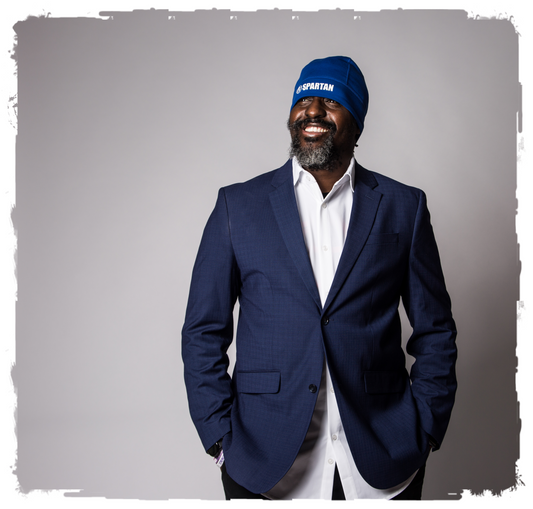If you're reading this then chances are that you have at least some interest in getting stronger. Now, that may sound as simple as just "lift heavy stuff, bro", but that's where you're wrong, bro.
So let's dig right into this and break down 5 things you should be taking into consideration if strength on is on the menu.
1. Getting bigger doesn't necessarily mean stronger
...And getting stronger doesn't necessarily have to mean bigger as the converse.
We've all seen this right? You walk into your local gym and some new guy you've never seen before is over skulking around the dumbbell rack. You make your way over, set down your gym bag, your shaker cup, your Battle Bar obviously, and realize that dude is huge. As you continue to judge yourself and question why you even keep at this stupid sport, you realize he struggles with what are warm up weights to you for his top set.
Now, why is that? Is it because he has inflatable muscles like Spongebob competing in an underwater strongman comp? Doubtful, but if you find some inflatable jacked arms let me know on the downlow. The reason is most likely that he trains for hypertrophy while you have been focusing on training your central nervous system and working on your form in a completely different manner whilst concentrating on strength training.
There are two types of "getting bigger". You could add lean muscle mass, OR you could eat a bunch of garbage and pack on the lbs(personal favorite of mine). Neither of these truly adds that much strength overall. Packing on the pounds and adding some body fat may make you feel stronger than you were, and it may add a couple lbs to that max deadlift , or maybe to your bench press, but chances are you just added some mechanical leverage to your overall bodyweight against the bar and didn't really increase your strength. Adding some lean muscle tissue, and strenghthening the fibers you already have may have small affect on your strength but not like you would think. Especially once you've already trained for a considerable amount of years. It becomes sort of diminishing returns at some point where need to begin focusing on form and CNS conditioning.
You see, the two can overlap and go hand in hand. Afterall a bigger muscle can output more strength, but without focusing on technique to move the weights and teaching the muscle to respond to the type of load you demand when training with high sub-maximal numbers, you won't necessarily be strong just because you're big.
This segways me nicely to my second point, and what you should be taking into consideration if you want to get real strong. Not Spongebob strong, nerd.
2. The Central Nervous System

Scienc-y pic for nerds.
Here we go.. a bunch of doctor jargin and medical phrases..
But wait, there's more! The CNS is so much more than just fancy acronym that you might not understand.
Your CNS controls most of what you do with your body from lifting that fork to your mouth,as well as that PR front squat. Without training your CNS properly to carry heavier and heavier loads, you'll eventually stall as far as number on the bar is concerned.
Progressive overload is great way to prime the CNS to continue making strides in gaining strength overall. By continuing to focus on heavier and heavier compound movements you're essentially training your brain and CNS to say "hey this is a frequent occurrence where I need to support this kind of weight. I should get stronger".
An added note here, you can and do "burn out" your CNS with frequent heavy training. The same principles of over-training are present here, and in fact are just as much a reason some days those 45's just feel heavier because of your muscle being fatigued, as well as the CNS being over stimulated or over-trained.
3. Sleep isn't for the weak
Sorry Bring me the Horizon, sleep is in fact for the strong.
Ever heard the term muscle naps? no..not cat naps, but muscle naps. They're great, and well..they're basically anytime you're napping/sleeping. Ya see, you probably already know this but it needs to be said over and over again because the value is underestimated. Sleep is the time where your body is repairing and growing the most, and missing out on that time should be the cardinal sin of anyone trying to actually make some gains out here.
It's a common misconception that you're building muscle in the gym, because in reality it's where you break muscle. It's where all the tearing of fibers and stress occurs so that later on during rest times you can repair those broken down muscle groups.
... And I know, we're all guilty of not getting enough sleep sometimes, but I'm here today to remind you that sleep is pinnacle if you want to recover properly and continue making progress on this journey.
4. Eat big, get big or eat big, get strong?

How about both.
Food is fuel, simple as that. You wouldn't expect a Ferrari to perform for very long on a quarter tank,right? Well same thing goes for your body. You can't perform optimally if you're constantly in a caloric deficit to shred body fat and see those abs or just because you're not reaching your daily caloric needs for whatever reason.
There are a myriad of processes the body goes through when breaking down food for fuel and proportioning the by-products. Among those are both short and longer term storage/usage of energy for the muscles to use. ATP/ADP are both resulting compounds of this breakdown process in the body and are stored in the muscles. Eating more is how to replenish the storage essentially. Therefore meaning caloric intake has a drastic result in your overall output abilities any given day, not to mention all the recovery aspects as well.

I guess that's why Goku was always eating so much, huh?
5. You don't need every accessory in your gym bag every workout
But...but...how will everyone know that I'm a super cool powerlifter if I don't wear two belts and four pairs of elbow sleeves every time I'm in the gym?
Full disclaimer before we dig into this point: I'm not saying you shouldn't wear a belt, or put on those wrist wraps when your wrists and forearms have been bothering you..sheesh.
The fact of the matter is that if you want to get strong, you probably want some of that strength to carry over into everyday life and be applicable in the real world, am I right? Well in the real world when you need to move that rock, or help your buddy move that dresser upstairs, you're not going top have time to run out to your car to put on your knee sleeves, chalk up your hands, do forty-three different breathing exercises...I think you get what I'm saying.
Every lifter should be spending time without all of the accessories to make sure that they're truly developing well rounded muscle groups. you're only as strong as your weakest link after all.
I'm not here to demonize lifting gear, as I have plenty in my gym bag as well. But what I am saying is that too much is too much. Using straps on your deadlift every time you pull is going to end up leaving you with grip issues without them. Is there a time and a place to utilize straps though? Yes. Wearing a belt the entire time you squat from warm up or close to it is going to leave you with a weaker core. Using wrist wraps for every pressing movement is going to leave the lifter with weaker wrists unassisted.
I hope you're still following me here.. The take away being you can in fact have too much of a good thing. All the equipment I mentioned is great when utilized rationally. Belts are fantastic when the weights are getting heavy, so are wrist wraps, but you don't need them every damn set...just put 'em away for a little bit, alright?
That wraps up 5 things I think you should know if you didn't already about your strength and training.
But there's always more to talk about so leave us some feedback and let us know what else you want to hear about on the Battle Bars blog and podcasts.








1 comment